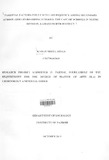| dc.description.abstract | Delinquent behavior is not a new phenomenon in the contemporary education system among girls. The term delinquency in learning institution is used to refer to indiscipline. This study indicates that it is manifested in the form of stealing, fighting, bulling, cheating in examinations, defiance to authorities, chronic classroom disruption, sneaking out of school, alcohol/drug abuse, use of obscene language, negligence of assigned duties and failure to do home work. The findings of this study revealed that most of the delinquent indicated multiple responses to the delinquent acts.
This study aims at assessing the perceived parental factors have a casual link to delinquency among girls in boarding schools. Social leaning theory and attachment theory give a theoretical and pragmatic explanation of the position of both the parents and their children. From the findings of this study it is evidence that parental factors influenced delinquent girls more negatively than the non delinquents. All the parental factors under the study significantly contributed to the delinquency among girls in boarding schools.
The findings on marital conflicts indicate that most delinquent girls came from homes where parents/guardians were involved in conflict as compared to the non delinquents. From the responses, girls who had such parents/guardians were anxious and constantly engaged in aggressive behavior, especially when confronted with disagreement with others. Non delinquents hated this conflicts lived to intervene but learnt to use diplomacy in solving conflicts between themselves and others.
Parental deviance contributed greatly to delinquent behavior among girls as the findings revealed that most girls were influenced by their parents/guardians deviance. They learnt stealing alcohol/drug abuse, use of obscene language and cheating (telling lies). This is not the case with the non delinquencies as their responses indicated moat of them had good role model parents. Broken homes as a result of divorce, separation and death were a prominent delinquent factor among the delinquent girls especially those living with grand parents and older siblings. A good number of non-delinquents came from homes with both parents and although some came from broken homes, the findings do not indicate its influence negatively. Unfavorable parenting single is probably the most significant factor correlated with delinquency among girls in boarding schools.
The findings revealed that non-disciplinary approach among parents is seen as a cause of delinquency among girls. The exercise of parental discipline consists in the parents' way of creating or neglecting to create a specific order in the lives of their children. Extreme strictness, leniency and inconsistent disciplinary approaches are largely associated with delinquency. The findings revealed that lack of parental supervision and monitoring has a casual link to delinquency as indicated in the responses from the delinquent girls. Non existence of rules by some parents, emotional detachment and uninvolvement (Negligence) are attributed to delinquency among girls.
Non-delinquent girls' responses indicate that they had warm communicative and parents who rewarded good behavior and punished reasonably avoided being involved in delinquency so as not to spoil the' relationship with parents. From the findings, it is evident that parental factors indeed contribute to delinquency among girls and the researcher came up with the following recommendations based on the findings of the study. Parents therefore need to evaluate themselves on their roles and failures so as to help restore and maintain discipline in schools. Parents need to cooperate with teachers and school administration in trying to understand and help the students out of the delinquent problems. Parents should exercise firm authority over their children as this will minimize negative dispositions of children as they grow up. This will help in raising children who are acceptable in the society. | en_US |

